Exploring Canine Cuisine: Can Dogs Eat Banana Peppers?
As devoted pet owners, we often find ourselves pondering over what treats we can share with our furry companions.

Prepare for a litter of healthy kittens - get all the help you need on how to breed cats for healthier offspring in this guide!
Looking to unlock the key to stronger, healthier cats? Look no further! In this blog post, we'll show you all the tips and tricks you need to know in order to make sure that your cat breeding program produces only the best results. So let's get started on your journey to raising healthy kittens!
Table of contents [Show]

Cats can be bred to produce healthier offspring that possess desired traits. Breeding cats should be done ethically, with the health of the cats and kittens being of paramount importance. By selecting two cats with strong heritable traits, such as strong genetic diversity or being free from genetic diseases, you can raise healthy and happy felines that will become cherished members of your family.
This guide will provide an overview on how to select which cats to breed along with the basics on cat breeding cycles, genetics, responsible care and more. Additionally, this guide will cover the laws related to breeding in your state or country, as these can vary widely.
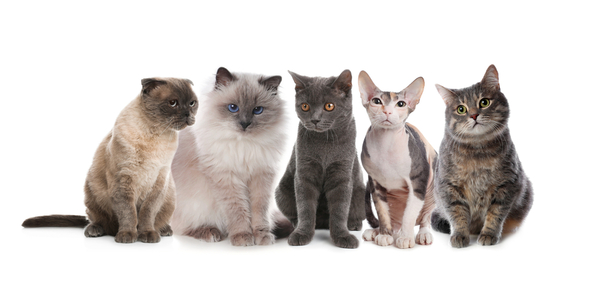
Before you even begin to choose the parents of your future litter, it is important to understand the basics of cat breeding. Breeding cats requires knowledge and understanding of feline genetics and how those genetics can be passed on to offspring. The process involves careful selection of compatible cats within a specific breed, research regarding their history and ancestry, and understanding how their genetic traits may shape the development of their offspring.
In order to ensure healthy kittens are born, you need to know if either parent has genetic health issues or other physical problems that could be passed on to their offspring. All breeders should conduct specific health tests prior to mating cats in order to identify potential hereditary diseases or other health problems that can be affected by breeding. It is also important that both parents have sufficient immunity by receiving regular vaccinations prior breeding in order keep them and their litter safe from illness during pregnancy and nursing.
In addition to keeping your cats healthy physically, it is very important to consider socialization as well – doing so can help in reducing the risk that your kittens will have behavioral or emotional problems later in life. Well-bred kittens will not only have healthier physical attributes but also a better temperament; both parents should already display a friendly attitude towards people before being considered for mating.

When it comes to breeding cats for healthier offspring, one of the most important steps is selecting healthy cats to serve as parents. Cats should be tested for viruses and conditions that could be passed on to their young.
Mating cats with similar pedigree and health history can help reduce the risk of abnormal genes being passed on to the kittens. Pedigree parentage testing ensures both parents are from desirable bloodlines, which can then improve the resulting litter’s chances of a long and healthy life.
When selecting parents for breeding it is important to keep in mind certain characteristics that make for a better breeding candidate, such as:
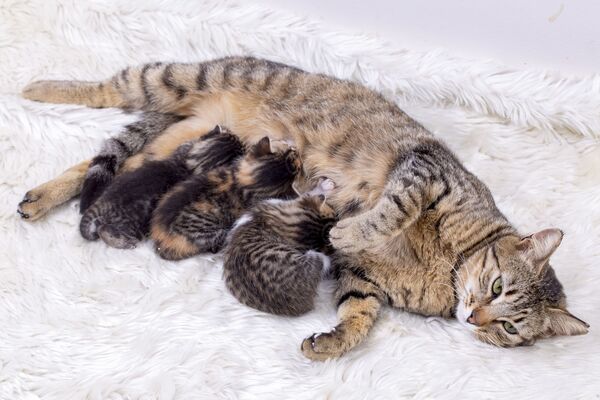
Before breeding cats, you should take several steps to prepare your cats physically and mentally for the process. Both male and female cats should receive a full medical exam from your veterinarian, since health issues may affect their ability to breed and the kitten's health later on. Consider having any genetic tests recommended by your veterinarian performed in order to avoid potential problems with individual cats or the entire litter after birth.
It is important to select only healthy, good-tempered cats that have sound dispositions and show no signs of illness or temperament issues in order to ensure that kittens will inherit as many desirable traits as possible. When selecting breeding candidates, carefully consider bloodlines, physical characteristics such as size and coat length, health screenings such as Feline Leukemia (FeLV) testing and methods of socialization used by the cattery.
Both mom-to-be and dad-to-be should receive proper nutrition before breeding occurs. Monitor their weight gain throughout pregnancy using a bathroom scale or body condition scoring system used by veterinarians. Ask your veterinarian for specifics regarding diet for both pre-and postbreeding stages of care for mother cat in particular since she will need access to ample amounts of calories throughout gestation and nursing periods.
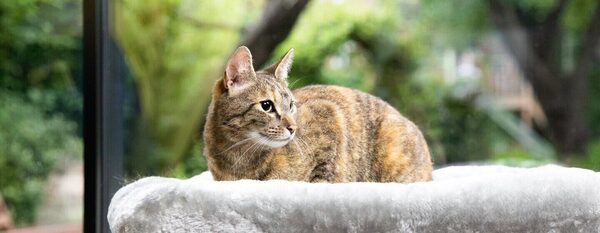
Breeding cats is a rewarding experience that can help ensure the continued health and vitality of purebred lineages. It also allows you to make a positive impact on the lives of cats and cat owners. When done responsibly, breeding cats can result in healthier kittens with desirable traits and personalities.
Before considering to breed cats, ensure that you have extensive knowledge of feline genetics and the history of breeding practices in your particular breed before making any decisions.
Essential considerations before embarking on breeding include the age and health of your potential parents, as well as their genetic heritage. Pay special attention to any prior generations that may have been affected by hereditary diseases or genetic conditions. If there is any question about pedigree or background, research further before continuing with your plans for a litter.
Prospective parents must be healthy, pre-tested for diseases associated with their breed (e.g., heart disease in Maine Coons), free from signs of behavioral issues or aggression, and have up-to-date vaccinations as recommended by your veterinarian/breeder/animal welfare organization experts. Ensure they are also spayed or neutered according to code of ethics from animal welfare organizations if an unplanned litter were to occur - given that irresponsible breeding practices create an abundance in unowned animals which is both taxing on animal rescue systems and morally unacceptable for a pet owner/breeder.
Before beginning a mating process consider:
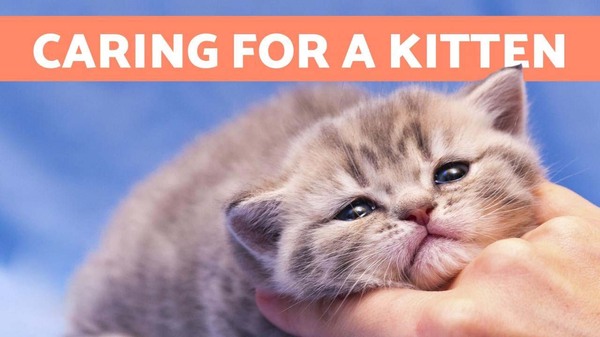
Caring for kittens is a critical part of successful cat breeding. Keeping kittens healthy during the first few weeks of their lives sets the tone for their future health for the remainder of their lives. As a breeder, it is essential to spend time with each litter and monitor their development closely to identify any potential health concerns early on.
The first step in caring for kittens is to maintain a sanitary environment. Ensure that all litter trays are clean and free of debris or disease-causing agents such as mites, fleas, ticks, or parasites. Clean up soiled areas or objects quickly and efficiently using pet-safe cleaning products. Also make sure that the resting area remains comfortable and warm with plenty of soft bedding material that can be changed regularly.
Adequate nutrition is critical in proper development, as this will set the tone nutritionally into adulthood. Make sure to ask your veterinarian or research proper kitten diets online prior to joining in on the caretaking process. It's also important to ensure access to fresh water throughout all days and nights; many kittens have difficulty drinking from water dishes due to recognition issues due to early separation from siblings and mothers but can be taught with practice over time. To help prevent dehydration it may be beneficial to feed kitten-specific wet foods a few times daily from weaning age up until adulthood as well as providing high-quality dry kibble in separate dish as desired, allowing them discretion access throughout each day depending on appetite levels.
In short: Effective cat breeding requires dedicated effort when it comes to caring for young kittens during the growing stages of life. Implementing good sanitation practices combined with providing adequate feeding supplies encourages healthy growth, development, and overall wellbeing for thriving kittens which leads into beautiful adult cats ready for adoption into loving homes!
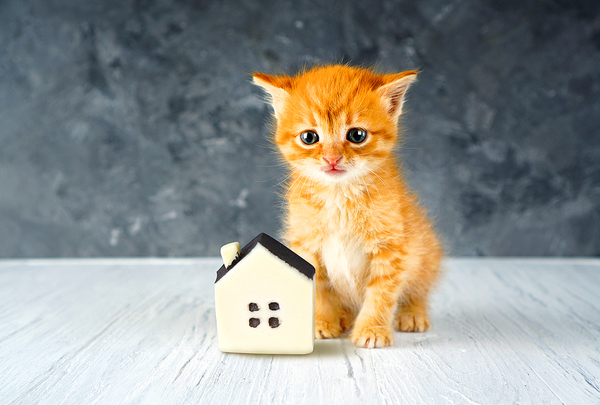
Rehoming kittens is a great way to ensure that they have loving homes while preventing further overpopulation of cats. It’s important to note that rehoming kittens is different from adoption, as the animal has already been born and doesn’t need to find a home right away.
When rehoming kittens, it’s important to consider each cat's unique needs and characteristics. It helps to research breeders ahead of time in order to know what kind of kitten you are dealing with and what its potential mixes are. Making sure your cat comes from an experienced breeder who takes good care of the animals is essential for successful rehoming.
Once you’ve found an experienced breeder and selected your kitten, it’s important to make sure that the animal receives proper veterinary care. Make sure it has received all necessary vaccines, deworming treatments, flea prevention, and any other medical care it may need prior to being adopted out into new homes. The health of the kitten should always be monitored closely throughout its life in order to ensure its well-being both now and in the future.
It can be easy for people to underestimate how costly proper veterinary care can be - when selecting adoptable kittens costing should also be taken into account when finding suitable homes. Rehoming kittens provides breeds with healthier offsprings due their breeding conditions – which then creates happier homes filled with healthy feline friends!
In conclusion, selecting the right cats to breed is an important step in ensuring healthier offspring. Through careful research and consideration of all aspects of their health, owners can make educated guesses about which cats would produce the healthiest and happiest cats.
The owner should also pay close attention to their environment and provide them with all the medical care necessary for a safe breeding experience. Additionally, owners should be open to talking with experienced breeders and veterinarians who can advise them in making proper decisions during each step of the breeding process.
With proper preparation, responsible cat owners can easily increase the chance of healthier litters from their cats:
Cats are likely to gain from better management in every situation. Make sure your cat is getting a proper amount of a high-quality, well-balanced diet, maintain a stress-free environment for your cat, and take precautions to get rid of overcrowding and other stressors.
Since a cat won't ovulate until after mating, it's crucial to ensure that she gets bred more than once while in an estrous cycle. The queen should have a 90% chance of ovulating if she breeds three times per day for the first three days of the estrous cycle.
It is acceptable to breed similar cats and register the resulting offspring. Breeding cats that are closely related, such as mother to son or father to daughter, is known as inbreeding.
Mock Turtle exclaims, "Go on, old fellow!" 'Don't worry about it the whole day!' Since she'd left, he'd been going on for quite some time.
As devoted pet owners, we often find ourselves pondering over what treats we can share with our furry companions.
If you're looking for ways to boost your breast milk supply, you may want to consider adding these four superfoods to your diet.
How to Feed a Wild Rabbit - What to Feed Wild Rabbits? What do rabbits eat? How to feed wild rabbits safely. Should I feed wild rabbits? Why should I feed wild rabbits?


